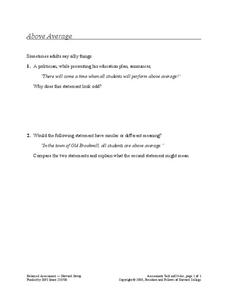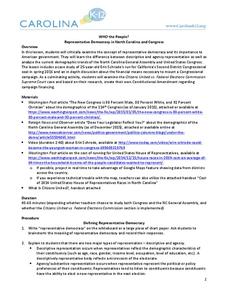Teach-nology
Author’s Purpose: Inform
Why does an author write an informative article? Learners examine passages of a short reading on Spain and determine what the author wanted to inform the reader about.
Mathematics Vision Project
Module 6: Congruence, Construction, and Proof
Trace the links between a variety of math concepts in this far-reaching unit. Ideas that seem very different on the outset (like the distance formula and rigid transformations) come together in very natural and logical ways. This...
American Chemical Society
Man and Materials Through History
From the start of the Industrial Revolution, it only took 147 years for someone to invent plastic. This may seem like a long time, but in the history of inventing or discovering new materials, this is incredibly fast. An informative and...
Curated OER
Studying The Catcher in the Rye
What's the difference between being a phony and being a conformist? At what point does conforming to alleviate loneliness lead to insincerity? These are the questions at the heart of this unit plan that uses The Catcher in the Rye...
Balanced Assessment
Above Average
Raise the bar and strive to be above average. The assessment task requires budding mathematicians to think critically and evaluate given statements. What does it truly mean to be above average?
Curated OER
Osmosis and Dialysis
How do you engage pupils in a discussion about osmosis without leaving them overwhelmed? By providing them with the tools to perform an exciting experiment, and they will see osmosis in action! Young chemists and biologists use...
Chicago Botanic Garden
Faces of Climate Change
How does climate change affect you? First in a three-part series, the activity focuses on how individuals living around the world are affected by climate change. Individuals take on the role of a given character and share their...
Carolina K-12
Who the People? Representative Democracy in North Carolina and Congress
Our elected officials are supposed to represent us, but what does it mean when they aren't like us? Budding citizens explore the demographic makeup of the US Congress, the role of money in political elections, and the Citizens United...
CK-12 Foundation
Sample Spaces and Events: Triple Spin!
Scholars determine the number of possible outcomes when a spinner is spun three times. They start with the case of one spin and build up to the case of three spins.
PBS
Stories of Painkiller Addiction: Contemplating Nature vs. Nurture
Does having an addict in your family make it more likely to become one yourself? Explore the genetic risk factors, as well as the prominent environmental influences, for substance addiction in a lesson that encourages awareness and open...
Cornell University
Sound Waves
How does sound travel through different mediums? Scholars explore this question by creating and observing sound waves as they learn the difference between transverse and longitudinal wave motion. Using their new knowledge, class members...
US Institute of Peace
Practicing Conflict Analysis
Does your conflict management style keep you cool and persuasive, even under pressure? Young behaviorists practice analyzing conflicts and using conflict management skills during lesson five in a 15-part series. The resource contains...
Curated OER
An Introduction to Simple Machines
Students investigate simple machines and their uses in everyday life. In this scientific method instructional activity, students examine physical tools such as wedges, screws, and levers using a "how does it work" approach....
Curated OER
Auxiliary Verbs Exercises
For this gap fill worksheet, students fill in the blanks to sentences with do, does, doesn't, don't, am, is, are, or I'm. Students complete 45 sentences.
Curated OER
Do They Rhyme?
Students pick out words that rhyme. In this lesson on rhyme, students listen to the teacher read the poem "My Robot Does My Homework" by Kenn Nesbitt and pick out words that rhyme.
Curated OER
Question Tags - Negative
In this negative expression worksheet, students fill in the blanks to negative expressions with either the word am, is, are, do, or does. Students complete 10 sentences.
Curated OER
How Does a Butterfly Grow?
Students explore the stages of a butterfly. They read and discuss the book, The Very Hungry Caterpillar, by Eric Carle. They draw a picture of their favorite part and create a graph. They write a letter to Eric Carle and observe a...
Curated OER
Mind Over Matter: How Does the Brain Work
Students research previous attempts by scientists to discover the ways in which the brain works, design and conduct an experiment to illustrate current research and present their findings to the class.
Curated OER
Changing States: Does it Matter
Young scholars participate in experiments to visualize the differences between chemical and physical changes. They attempt to detect the five characteristics of a chemical change.
Curated OER
How Much Does That Car Cost?
Students calculate how much it costs to buy a used car and finance it through a bank. They select a car from the newspaper, conduct Internet research on current auto loan interest information for four different states, and create a...
Curated OER
Where Does it Come From?...Where Does it Go?
Young scholars summarize and illustrate how a water treatment plant and wastewater treatment plant work. Students describe the source of water for their community and the adequacy of groundwater to meet the community's needs. Young...
Curated OER
How Does Speed Change?
In this speed learning exercise, learners use a graph that shows various speeds to answer 13 questions. For example. "What is the greatest speed the worm reaches?"
Curated OER
How Does Vegetation Decrease Erosion?
In this erosion activity, students will compare what happens to soil when water flows over soil with no vegetation and soil with vegetation. Then, students will complete four short answer questions.
Curated OER
What Does Time Have to Do with it?
Students investigate time. In this investigative lesson, students run through an obstacle course using standard timers. They record the time and apply this knowledge to problems in math. Students record their predictions, and graph...
Other popular searches
- Picture Does Not Belong
- Life Doesn't Frighten Me
- Al Capone Does My Shirts
- Do and Does
- Sentence Doesn't Belong
- Which Word Does Not Belong
- Beatrice Doesn't Want To
- Does Not Belong
- How Does Light Travel
- Sentence Does Not Belong
- Which Does Not Belong
- Anansi Does the Impossible























